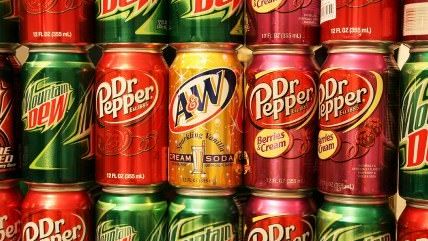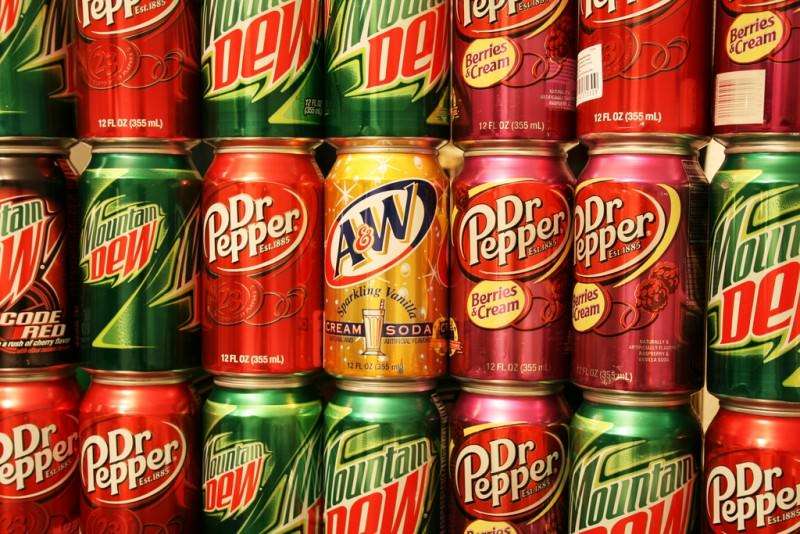San Francisco Vs. Soft Drinks
An elected official is trying to protect you from unsavory hucksters peddling empty illusions to profit from your gullibility. Maybe it takes one to know one.


The San Francisco Board of Supervisors has something it wants to say: Fizzy sugar water can make you fat and rot your teeth.
I'll pause while you pick yourself off the floor, where you landed in shock at this blinding revelation. Until now, you have probably been pouring Mountain Dew on your organic hemp granola in the belief that it contains only nutrients that are vital to your health. So processing the news may take a minute.
Actually, the supervisors don't so much want to say that as they want to make someone else say it—namely, the companies that make these products. Under an ordinance approved by the board and awaiting action by the mayor, billboards and other ads for most beverages with added sugar would have to carry a large, ominous message: "WARNING: Drinking beverages with added sugar(s) contributes to obesity, diabetes and tooth decay." Skull and crossbones to follow.
There are several things wrong with the warning. One is that it ought to be delivered by Captain Obvious. In theory, there could be people who regard high-calorie carbonated drinks as a fountain of youth or a cancer cure, but good luck finding one. Anyone with the intellectual capacity to operate a vending machine probably understands that Dr Pepper is not actually prescribed by doctors.
Another flaw in the warning is that it's misleading. Beverages with added sugar can cause weight gain and dental problems. But the same can be said of beverages without added sugar.
Josh Bloom, director of chemical and pharmaceutical sciences at the American Council on Science and Health, says: "Twelve ounces of orange juice contains 36 grams of sugar, which is equivalent to 144 calories. If somehow, there was such a thing as an orange without sugar, if you took the juice from it and added 36 grams of sugar, you would have a drink that is identical to orange juice that you now buy. Yet, under this law, the latter drink would have to be labeled and the former would not."
There is also not much reason to believe that barraging consumers with information leads to better choices. A survey found that when New York City compelled fast-food restaurants to post the calorie content of menu items, just 28 percent of consumers said the new data influenced what they ordered.
And those people may be fooling themselves. The study, published in the journal Health Affairs, found that the average diner's calorie tally stayed the same after the law came into being.
A study of Starbucks outlets in New York concluded that posting calories did reduce the average number of calories ingested, but only slightly—from 247 to 232. In a country where the average person scarfs more than 2,000 calories a day, the change is monumentally inconsequential.
"There are very few cases where social scientists have documented that giving people information has changed their behavior very much," Carnegie Mellon University economist George Loewenstein told The New York Times last year. "Changing prices and changing convenience have big impact. Providing information doesn't."
The San Francisco measure holds even less promise. The menu labels in New York provide information that most people wouldn't have—how many calories they would ingest with a particular item. But the sugary-drink warning would tell consumers only what they already know: Guzzling sweet liquids can have regrettable side effects over time.
That knowledge may explain why, as a study in The American Journal of Clinical Nutrition found, "the consumption of added sugars in the United States decreased between 1999-2000 and 2007-2008, primarily because of a reduction in soda consumption."
Those who resist the trend are acting not out of ignorance but out of preference. They aren't likely to suddenly change their ways just because the city expresses disapproval.
Expressing disapproval seems to be the main point. After the vote, Supervisor Scott Wiener, the author of the bill, needed an extension ladder to mount his high horse.
"Today, San Francisco has sent a very clear message that we need to do more to protect our community's health," he proclaimed. "Requiring health warnings on soda ads also makes clear that these drinks aren't harmless—indeed, quite the opposite—and that the puppies, unicorns and rainbows depicted in soda ads aren't reality."
Yes, San Franciscans, an elected official is trying to protect you from unsavory hucksters peddling empty illusions to profit from your gullibility. Maybe it takes one to know one.
© Copyright 2015 by Creators Syndicate Inc.


Show Comments (91)